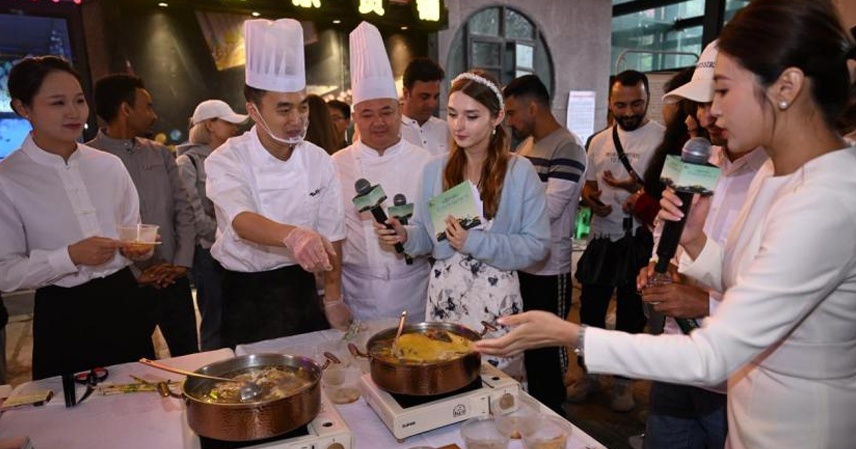Nestled at the foot of Jinfo Mountain, Chongqing’s Nanchuan District boasts a treasure trove of natural resources and over 205,000 mu (about 13,667 hectares) of Chinese herbal plantings, yielding abundant research and more than 20 signature medicinal cuisine dishes that grace local tables as everyday wellness staples. On May 10, 2025, the “Tell the World About Chongqing” Five Continents Taste Challenge for Jinfo Mountain Medicinal Cuisine Overseas Promotion Activity brought this heritage to life, with international students from Chongqing University of Posts and Telecommunications stepping up as “herbal cuisine experience officers” to sample and test the flavors.
Guided by Chef Zhang Zhao—a master Chinese culinarian and Golden Chef Award recipient—the group from Pakistan, Russia, Nepal, Vietnam, and Thailand dove into a lineup of 10 aromatic Jinfo Mountain specialties, blending savory bites with health benefits in a cross-cultural feast.

Savoring the Essence: Tianma Pigeon Soup Challenge
The event kicked off with the subtle artistry of Tianma Pigeon Soup, where Russian student Xueming tackled a blind tasting. Faced with three visually similar bowls—each with slight formula tweaks—she had to pinpoint the one infused with Tianma (Gastrodia elata).
Sniffing and sipping methodically, Xueming noted: “The second has a milky note, the third carrot hints—this first one carries a mild sweetness and herbal edge; it must be the Tianma version.” Spot on! The chef explained the dish marries tender squab with goji berries, red dates, and Tianma, slow-simmered to unlock nutrients. Beyond its rich taste, it nourishes blood, calms the liver, and eases headaches— a prime example of food as medicine in Nanchuan.
Chef Zhang highlighted Tianma’s dual role as food and herb, quelling spasms, balancing liver yang, and easing wind-damp. For home cooks, opt for fresh or soaked dried roots in moderation to avoid bitterness; pair in stews like chicken or pigeon, but keep simmering gentle to preserve active compounds.
Steaming Tianma Pigeon Soup: A harmonious blend of tender meat and herbal depth.

Qi-Boosting Delights: Fengming Dongjie Guiqi Chicken
Wafting aromas drew the group to Fengming Dongjie Guiqi Chicken, a steaming pot of hen infused with Astragalus (Huangqi) and Angelica (Danggui). Prepared by honey-frying the Astragalus, stuffing the bird with spices, and long-steaming, it yields juicy meat laced with medicinal aroma—ideal for replenishing qi and blood, though cautioned against during menstruation or pregnancy.
Savoring a piece, Zhang praised the tender texture: “No dryness means perfect heat control; Danggui invigorates blood, Huangqi nourishes it—a duo for vitality.” Students echoed the praise, marveling at the seamless fusion of flavor and function.
Puzzle and Potion: Yuzhu and Yangyan Yishou Insights
Hands-on fun ensued with a Yuzhu (Polygonatum odoratum) puzzle assembly, unlocking its yin-nourishing, thirst-quenching virtues. Versatile in porridges, teas with goji or honey, or stews alongside chicken and other tonics for 1-2 hours, it embodies medicinal cuisine‘s adaptability.
Next, Yangyan Yishou Soup wowed with highland free-range black chicken, beef liver, matsutake mushrooms, secret shiitakes, pepper, dates, and goji—simmered 5-6 hours in mineral water. “Bursting with umami mushroom essence,” Zhang noted, dubbing matsutake “vegetarian meat” for its beauty-boosting and immunity-enhancing perks. Pakistani student Nas shared: “First time trying this— the scents alone scream freshness. Matsutake’s big here too, but smaller; great for everyone.”
Yangyan Yishou Soup: Black chicken and matsutake for radiant health.
Goose with a Golden Touch: Huangjing Tonic
At the “Nourishing Delicacy” zone, Huangjing Goose Soup captivated. Featuring year-old goose blanched for purity, then pressure-cooked with pre-soaked Huangjing (Polygonatum sibiricum), Codonopsis, and Angelica before a final earthenware simmer, it fortifies lungs, spleen, and kidneys while boosting immunity and moistening dryness.

A student queried the subtle herbal whisper: “Medicinal yet delicious—what’s in it?” The chef revealed the lineup. Locally dubbed “tiger ginger,” Huangjing matures 5-7 years on slopes from 500-2,800 meters, often stewed with pork feet or poultry. Zhang called it “immortal’s rice” in TCM: “Moistens lungs above, tonifies stomach mid, kidneys below.” Pro tip: Peel the skin from 5+ year roots for powdery texture; count “knots” to gauge age—one per year.
Relying on taste memory, the students aced identifying it among three soups.

A Feast of Flavors and Futures
The lineup rounded out with Jin Fo San He Soup, Jinfo Mountain Yam Mutton Soup, Ginseng Bamboo Tail Soup, Yam Chestnut Native Chicken Soup, Houttuynia Cordata Stuffed Tofu, and Medicinal Oyster Dishes. Participants raved: “Herbs as ingredients? From soups to grills—tasty and tonic!” The event demystified Chinese medicinal cuisine, fostering appreciation for its roots and recipes.
As bridges between palates and traditions, these experiences highlight Jinfo Mountain’s role in global wellness dialogues.



